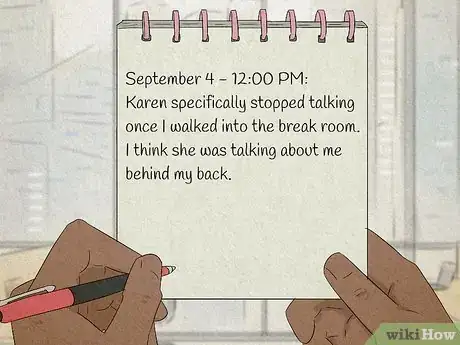This article was co-authored by Lauren Krasny and by wikiHow staff writer, Amber Crain. Lauren Krasny is a Leadership and Executive Coach and the Founder of Reignite Coaching, her professional and personal coaching service based in the San Francisco Bay Area. She also currently coaches for the LEAD Program at Stanford University Graduate School of Business and is a former Digital Health Coach for Omada Health and Modern Health. Lauren received her coaching training from the Coach Training Institute (CTI). She holds a BA in Psychology from the University of Michigan.
There are 8 references cited in this article, which can be found at the bottom of the page.
This article has been viewed 37,174 times.
If you're being disrespected, bullied, or mistreated at work, it's important to stand up for yourself. This can be pretty uncomfortable, though, especially if being assertive doesn't come naturally to you. We totally understand! To help you out, we've compiled a list of ways to handle a variety of workplace scenarios. Don't be afraid to speak up for yourself on the job—you absolutely deserve respect and fair treatment.
Steps
Stay calm no matter what.
-
Reacting in anger may come off as aggressive rather than assertive. We know it's not always easy to keep your cool in a tough situation, but do your best. Pause, take a few deep breaths, and give yourself a moment to think before saying anything. If you clap back in the heat of the moment, you may end up looking like the perpetrator rather than the victim.[1] X Research source
- If you need to, walk away for a few minutes to collect yourself. Once you're calmer, go back and address the situation in a civil, professional way.[2] X Trustworthy Source Harvard Business Review Online and print journal covering topics related to business management practices Go to source
- If you're feeling upset about something, ask yourself, "How important is this right now? Is it going to be important a week from now?" That can help you get perspective on the issue.[3]
X
Expert Source

Executive, Strategic, & Personal Coach Expert Interview. 27 March 2020. - A calm, assertive response is a good thing! It’s a healthy way to let others know what you need and how you feel.[4] X Research source
Disagree with colleagues respectfully.
-
Speak up without tearing the other person down. If you disagree with a colleague’s opinion or solution to a problem, there's nothing wrong with speaking up about it. Try to avoid pitting your idea against theirs, though, which can seem aggressive. Instead, acknowledge the value of the other person’s idea before introducing your own.[5] X Research source
- For example, "Kathy’s proposal is solid and going that route could definitely benefit the company. I have another idea that may help us reach our quarterly goal even faster, though. What does everyone think about..."
- If you don't like the way your manager assigns shifts, politely offer an alternate solution. For example, “Mr. Sellers, I really appreciate that you want our shift assignments to be fair. Your recent changes got me thinking and I'd love to get your perspective on this alternative...”
Address problems quickly.
-
A firm verbal response is the most effective approach. If a coworker says or does something inappropriate, don’t go back to your desk and stew all day. Call out their bad behavior right away to nip it in the bud. Remember to stay calm, but use firm, direct language to tell them the behavior is unacceptable and needs to stop immediately.[6] X Research source
- For example, if someone calls you “Honey” in a meeting, immediately respond with, “I don’t like being called that. Please use my name to address me.”
- If a coworker tries to take credit for your work in a project meeting, let them finish speaking. Then, politely note your own contributions. For example, “Bill did a great job organizing the reports. With his help, I was able to analyze and file them a lot faster than usual.”
- If you don’t speak up quickly, your coworker (and anyone else who witnessed the act) will think it’s fine to treat you that way.[7] X Research source
Talk to the person in private.
-
They may not react well if you call them out in public. Aside from that, sometimes a public confrontation just doesn't feel quite right for that particular situation. For example, if a coworker talks over you in a meeting and they've never done that before, give them the benefit of the doubt! Wait until the meeting is over and talk to them about it privately.[8] X Trustworthy Source Harvard Business Review Online and print journal covering topics related to business management practices Go to source
- You might say take them aside later and say, "I realize you probably didn't mean to do this, but when you interrupted me at the meeting earlier, I felt belittled and a bit embarrassed. Can you be more careful about that in the future?"
Use questions instead of accusations.
-
Questions feel less confrontational. If you need to have a tough conversation with a colleague, try to avoid opening with aggressive statements like “I don’t like the way you’re doing this” or “I think your approach is wrong.” The person will immediately feel judged and probably get defensive. You can still be assertive and speak your mind with questions.[9] X Trustworthy Source Harvard Business Review Online and print journal covering topics related to business management practices Go to source For example:
- "Can you help me understand why Derrick got most of my assignments this week? Are you unhappy with the quality of my work?"
- "I'm not sure I understand why you CC'd the sales team on that email. I thought we were talking privately. Can you tell me why you did that?"
- "Would you mind explaining the new schedule? I know you must have a good reason for making changes, but our lunch breaks are 15 minutes shorter now."
Unite with coworkers against a bully.
-
Bullies tend to assume their victims will stay quiet out of shame. If you’re being bullied by a coworker, don’t suffer in silence. Reach out to other coworkers who you trust and ask them if they've had any issues with the bully in the past. Bullying behavior is usually a pattern, so other people will probably come forward. Band together, discuss the situation, and support each other.[10] X Research source
- Come up with a game plan together. Your boss is more likely to take your complaint seriously if other employees back you up.
Look at the situation objectively.
-
Some issues require a stronger response than others. If you’re being bullied, treated unfairly, or harassed at work, you absolutely need to stand up for yourself. Responding in the heat of the moment is never wise, though, so take a moment to step back and look at the situation before you escalate things.[11] X Trustworthy Source Harvard Business Review Online and print journal covering topics related to business management practices Go to source Unacceptable behaviors include:
- Coworkers gossiping about you or purposely excluding you
- Verbal abuse, yelling, or using profanity
- Purposely unclear tasks and unreasonable workloads
- Employees taking credit for your work
- Offensive jokes, nicknames, or comments
- Constant criticism, discrimination, or undeserved punishment
- Blocking opportunities for training or advancement[12] X Research source
Collect evidence for a formal complaint.
-
You'll need some proof if you plan to make a formal complaint. Try keeping a daily journal to jot down incidents as they occur. Include the date, time, and as much detail about the event as possible (including names of any witnesses). Save any memos, emails, and other written communication, too.[13] X Research source
Bring issues to your supervisor first.
-
This is the most professional way to handle a problem. If you need to take action or make a formal complaint about someone, go to your immediate supervisor first (assuming this person isn’t the perpetrator). If you escalate an issue over your boss's head, they'll be blind sighted when the formal investigation starts (which doesn’t reflect well on you).[14] X Trustworthy Source Harvard Business Review Online and print journal covering topics related to business management practices Go to source
- You might say, "Rebecca, do you have a few minutes to speak to me privately in your office? I would love to get your perspective on some things I’ve been dealing with lately.”
Go to HR if nothing improves.
-
Do what you need to do to stand up for your rights at work. If your boss downplays or ignores your complaints, feel free to escalate the issue to the next level of management or go straight to HR. Be sure to bring all of your evidence to back up your claims.[15] X Research source
You Might Also Like
 20 Good Excuses to Miss Work on Short Notice
20 Good Excuses to Miss Work on Short Notice
 How to Call in Sick When You Have Diarrhea
How to Call in Sick When You Have Diarrhea

 How to Respond When a Recruiter Reaches Out: 3 Email Templates and Key Tips
How to Respond When a Recruiter Reaches Out: 3 Email Templates and Key Tips
 Flirty or Friendly? 12 Signs Your Coworker Might Actually Be Flirting with You
Flirty or Friendly? 12 Signs Your Coworker Might Actually Be Flirting with You
 20+ Believable Excuses for When You’re Running Late
20+ Believable Excuses for When You’re Running Late
 How to Sell Your Skills: 10+ Great Ways to Put Yourself Out There
How to Sell Your Skills: 10+ Great Ways to Put Yourself Out There


 15 Basic Skills You Need to Be a Good Housekeeper
15 Basic Skills You Need to Be a Good Housekeeper

 How to Find Out Where Someone Works: The Ultimate Guide
How to Find Out Where Someone Works: The Ultimate Guide


References
- ↑ https://www.ccohs.ca/oshanswers/psychosocial/bullying.html
- ↑ https://hbr.org/2014/10/how-to-deal-with-a-mean-colleague
- ↑ Lauren Krasny. Executive, Strategic, & Personal Coach. Expert Interview. 27 March 2020.
- ↑ https://www.businessinsider.com/how-to-stand-up-for-yourself-at-work-2017-4#2-know-the-difference-between-assertion-and-aggression-2
- ↑ https://www.nytimes.com/guides/year-of-living-better/how-to-stand-up-for-yourself
- ↑ https://www.ccohs.ca/oshanswers/psychosocial/bullying.html
- ↑ https://www.forbes.com/sites/dailymuse/2016/03/10/3-times-youll-have-to-stand-up-for-yourself-at-work-because-no-one-else-will/?sh=58a91b266600
- ↑ https://hbr.org/2014/10/how-to-deal-with-a-mean-colleague
- ↑ https://hbr.org/2015/06/how-to-speak-up-about-ethical-issues-at-work
- ↑ https://www.theguardian.com/careers/2017/mar/28/the-psychology-of-a-workplace-bully
- ↑ https://hbr.org/2014/10/how-to-deal-with-a-mean-colleague
- ↑ https://www.ccohs.ca/oshanswers/psychosocial/bullying.html
- ↑ https://www.ccohs.ca/oshanswers/psychosocial/bullying.html
- ↑ https://hbr.org/2015/06/how-to-speak-up-about-ethical-issues-at-work
- ↑ https://www.ccohs.ca/oshanswers/psychosocial/bullying.html
- ↑ Lauren Krasny. Executive, Strategic, & Personal Coach. Expert Interview. 27 March 2020.
About This Article
























































